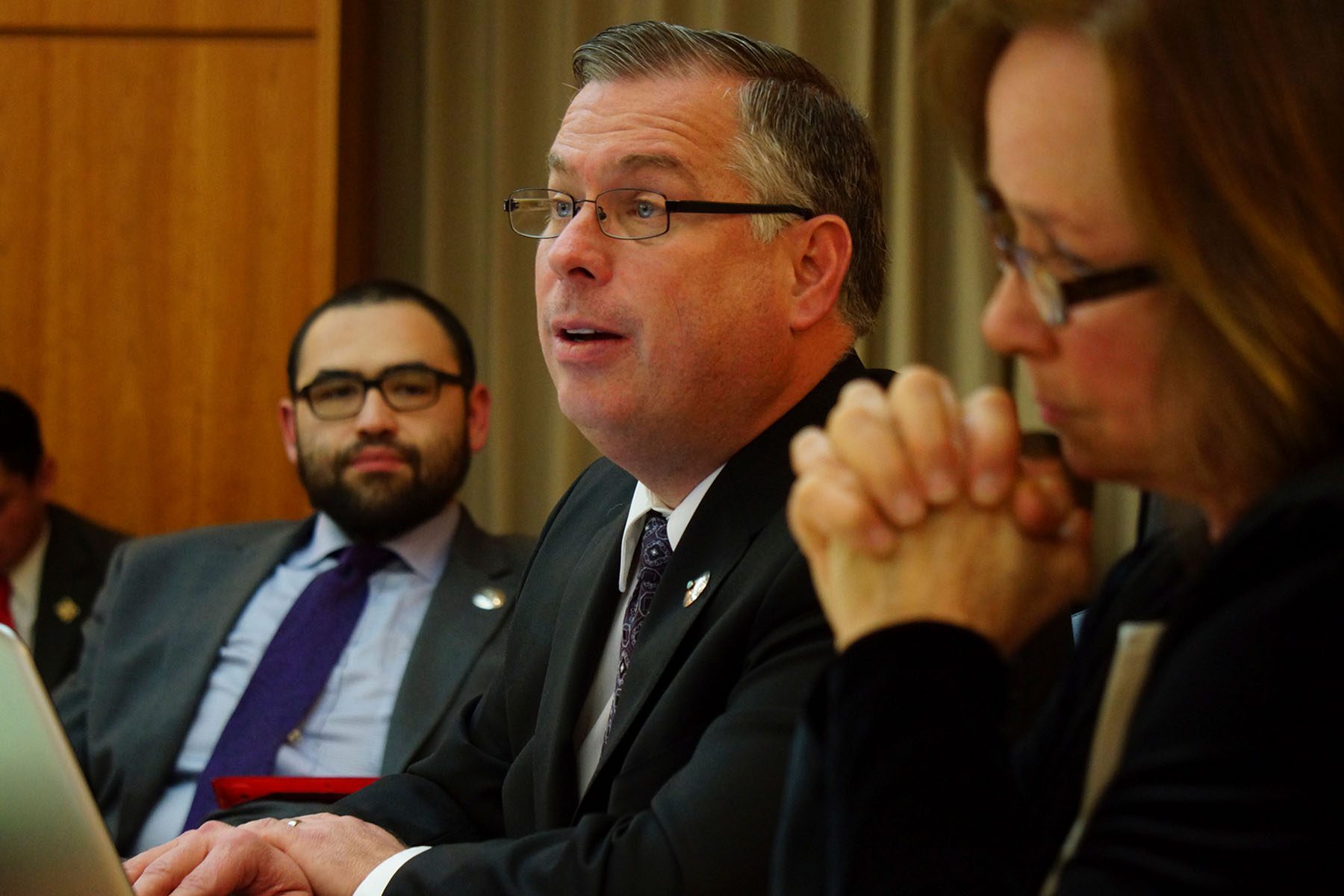Miranda Viscoli was used to seeing legislation change at the midnight hour. That’s what happened one Friday in 2017 when Viscoli, the co-president of New Mexicans for the Prevention of Gun Violence, was at the New Mexico capitol advocating for a bill that would “get guns out of the hands of domestic violence offenders” by requiring those involved in domestic violence situations to surrender their guns and be blocked from purchasing new ones while a protective order is in effect.
Minutes before Viscoli was set to testify on the floor of the state legislature, she said, state Sen. Daniel Ivey-Soto, who had just added language to the bill that ran counter to Viscoli’s goal, approached her. He pulled her into an area off the main floor situated between two glass doors, where no security cameras were present, and berated her.
“He got into my face — stuck his finger right in my face — and said, ‘Get your fucking shit together, Miranda,’” Viscoli remembers. She was so visibly shaken after the encounter that lawmakers canceled her testimony — and the vote.
“I was emotionally affected. You have to be tough to be doing gun violence prevention work — I call the FBI about threats all the time — but I was biting my tongue to not break down in tears,” Viscoli said. “I had to be an expert witness in two minutes, and then there was Ivey-Soto, walking back into the chamber, winking at the lobbyist from the NRA and smiling.”
Ivey-Soto, whose district is home to two NRA board members, did not respond to a request for comment.
The next week, still shaken, she went to some legislators in the statehouse she trusted and told them her story. The people she told were “horrified” — and also recommended she make sure that she was never in a room alone with Ivey-Soto in the future. They told her that if she spoke out against him, she might put the bill she was working to pass at risk.
“I thought, ‘Wow. This must be more than just me,’” Viscoli said.
Experiences like Viscoli’s aren’t rare. Statehouses – a place where the powerful and the less empowered rub shoulders as part of the policy-making process – are a place where abuse and harassment can flourish in the shadows, and consequences are slow to come if they come at all.
In New Mexico, the state legislature began an investigation into Ivey-Soto in March after a lobbyist, Marianna Anaya, filed a complaint against him, saying he had groped her, screamed at her, and then retaliated against her by tying up legislation she was working on when she rejected his advances. After Anaya filed her complaint, Viscoli published an op-ed in March describing her own alleged experiences with Ivey-Soto and asking that he be subjected to a full investigation.
Since Anaya’s complaint was filed, a growing number of women lobbyists and advocates — nine and counting — have come forward with allegations of sexual harassment and verbal abuse, and a coalition of 30 organizations in the state have asked for Ivey-Soto to have his interim committee assignments suspended until full resolution of the investigation is reached. The investigation was conducted by outside counsel who turned over findings to a legislative subcommittee, which will now decide whether there is adequate evidence to enforce disciplinary action. No timeline has been given for when this subcommittee will issue their decision. Ivey-Soto has denied all of Anaya’s and Viscoli’s allegations.
Dealing with alleged harassment in statehouses remains a maze of bureaucratic red tape that, despite efforts to improve processes, has left people in uncomfortable power dynamics or complete inaction after alleged sexual harassment or bullying.
In 2018, in the wake of the growing awareness for the #MeToo movement, 32 states introduced over 125 pieces of legislation to address sexual harassment in state legislatures, 37 of which were ultimately enacted or adopted. Twenty-nine states introduced an additional 100 pieces of legislation in 2019; of these, 29 have been adopted or enacted. And yet, state legislatures remain a place where harassment runs rampant.
The Associated Press kept track of all filings of complaints of harassment in state legislatures for one year, counting 76 reports made nationwide between 2017 and 2018; that tally had grown to 90 by 2019. A 2019 study published by a professor at Georgetown University’s Law Center found that the vast majority of government officials accused of sexual harassment and sexual violence are state senators and state representatives, with allegations more or less equally made against Republican and Democratic lawmakers. The overwhelming majority of these reports were women coming forward against men.
Heather Ferguson, the state director of Common Cause in New Mexico — a progressive voting rights and elections reform organization — spoke with investigators in the Ayana complaint. Ivey-Soto once referred to Ferguson and her co-director as “hips and lips,” and has publicly admitted to doing so. Ferguson said what concerns her the most is knowing that experiences like hers are happening around the country.
“In varying degrees, this is something that occurs in different statehouses based on the level of transparency on harassment, the tolerance level for harassment,” Ferguson said.
She calls the bullying and harassment of men lawmakers toward women the “worst kept open secret.” In a state like New Mexico, where the political sphere is “extremely small,” Ferguson said coming forward with a complaint of harassment meant risking “having every bill you touch destroyed thereafter.”
“We are frustrated because we have a personal, vested interest in creating a safe work environment,” Ferguson said. “Our statehouse is supposed to be the people’s house. The public should feel safe there. I shouldn’t have to instruct my staff to not go into a senator’s office or be alone for fear of being harassed or bullied.”
Andrea Johnson is the director of state policy, workplace justice and cross-cutting initiatives at the National Women’s Law Center, where she has worked on the issue of reform for harassment reporting and accountability procedures in state legislatures. The inherent power differentials that exist in state legislatures between staffers and lawmakers — and lobbyists and lawmakers — can make these environments especially risky.
“You have pretty significant power imbalances … that makes state legislatures ripe for harassment to happen.”
Johnson said a major issue that routinely comes up is legislative staff and lobbyists not knowing where to report if they experience harassment, especially when it is at the hands of state legislators.
Because state legislatures are accountable to voters, lawmakers don’t always have the same employment relationships with those who report to them as exist in most work environments. Making the dynamic even more complex is the fact that most legislatures do not have a trusted, neutral body that exists to receive any complaints against them. A committee of state legislators beholden to their colleagues are often left to evaluate allegations, a situation compounded by the historical make-up of these chambers, Johnson said, which is predominantly White men. It is these state-level lawmakers who are most commonly the perpetrators of this kind of harassment because of the “deep culture of sexism and racism” that exists in many state legislatures “where harassment has been common and honestly expected in the culture.”
The proximity can create uncomfortable dynamics. Ruth Ferguson (no relation to Heather Ferguson) alleged that she was sexually harassed by the district director for the state assemblyman she worked for in the California state legislature in 2019. She said she was harassed by this staffer, her superior, and reported the situation to the assemblyman’s chief of staff.
A year later, Ruth Ferguson learned the chief of staff failed to report her complaint — something she only found out after independently contacting the California general assembly’s Workplace Conduct Unit (WCU) — the independent panel the state established for handling harassment complaints — attempting to anonymously seek advice on the harassment, which was allegedly ongoing. A WCU representative asked if she would file a complaint or share which office she worked in. Ruth Ferguson told the WCU she did not feel prepared at that time, but intended to call back when she was ready.
Three months later, the WCU contacted her, asking her about details she shared anonymously and telling her that others had come forward to report misconduct in her office. Believing there were other complainants, Ruth Ferguson decided to go on the record and share details of her story with the WCU. She was not aware that there were not actually any other complainants at that time. Two months later, she received a call from the WCU investigator telling her that a formal investigation was opened in her name. They also noted that her chief of staff was notified that she was the complainant, despite previous reassurances by the WCU that her identity would remain anonymous.
Ruth Ferguson said that the WCU ultimately dismissed her allegations after a year-long investigation, but agreed inappropriate behavior had occurred based on the evidence she submitted. After the investigation, she was informed by the WCU that her own conduct was being investigated as a result of her complaint and based on testimony from employees she had accused of inappropriate conduct.
Since beginning graduate school to get her master’s degree in public policy, she’s co-founded an organization called Stop Sexual Harassment in Politics (SHIP) to advocate for changes in reporting and accountability in state legislatures in California and beyond.
“The really incredible thing about being a former legislative staffer who experienced harassment [and] discrimination is that there’s a fairly robust network of people throughout the country in different legislatures who experienced similar things and are willing to talk about their own experiences,” Ruth Ferguson said. “Having these people to reach out to and having them respond helped me understand the bigger picture.”
-
Read Next:
In mid-August, Democratic leadership in California’s general assembly put forth a proposal for changes to their WCU as a result of SHIP’s work on the issue. The proposed changes include creating a 60-day deadline for all investigations to be completed, increased communication with complainants regarding the status of resulting investigations, and collecting and releasing a report on data on all complaints filed — and their outcomes — since the WCU’s creation in 2019. Ruth Ferguson said these announced changes represent “a big win” for survivors of sexual harassment in statehouses.
Currently, there is no data reported on harassment complaints in the California assembly save for “one very general number” of cases reported to the WCU and the number of cases closed. Without more complete information, Ruth Ferguson said that it is impossible for the public to hold elected officials accused of harassment accountable. The lack of concrete data not only prevents the accountability being able to be enforced by voters, but can also erode faith in electoral systems as a result of voters feeling like they don’t have all the information they need to make choices about candidates — information that they may not even know to ask for.
“Information like that gives the public more confidence — it’s another accountability measure, it’s another check against harassment being allowed to happen. Right now, we don’t have that data and there is no way for reporters or the public or survivors to access any more information,” Ruth Ferguson said.
Johnson stressed that changes in reporting processes are critical for meaningful change. She said that having an independent entity responsible for receiving complaints and conducting an investigation and then making a recommendation on next steps is essential for creating a system people feel they can trust. Having complainants receive outside counsel along the way through the reporting process would be another tool for helping course correct many of the power imbalances baked into these systems.
Knowing a third-party system is in place to receive and investigate complaints can have a huge effect on larger cultural change in legislative bodies, said Kelly Dittmar, the director of research at Rutgers University’s Center for American Women and Politics. Dittmar is currently conducting research on what factors shape the recruitment, success, and retention of women in elected positions in state governments and has heard from those she has interviewed how much concerns about toxic workplace culture are driving the decisions of women wanting to work as staff in state legislatures. A large contributing factor to this situation is a lack of access to quantitative data on how harassment is handled.
“We talk about the pipeline for women in politics, but that pipeline isn’t only for office holders but for staff. Gender representation in staff has real implications for the setting of policy agendas and the culture of a legislative environment. Staff play a huge role in this and we tend to not pay attention to them,” Dittmar said.
That said, “it very much matters who is the position of power that gets to decide that an issue gets to the agenda,” said Dittmar, which is where accountability factors into the way that cultural change is made on the legislator level. “It’s a ripple effect of their perception of the world, those that think this is ‘locker room talk’ versus those who see the lasting and negative effects on women and gender equity. The people who believe the former will dismiss the folks doing work to create less toxic workplaces and who gets a say about how to define sexual harassment in legislatures. This is what we’ve seen in all of history. Why has it taken so long for things to get to this point? Because those in power have been denying that this behavior was wrong at all.”
Another major area of reform can be in collecting and releasing data on what complaints have been made about whom, so that voters have the information they need to enforce accountability through voting, experts said.
“In a legislative body, the accountability mechanism is primarily the electoral vote. So if somebody behaves badly, whatever that may be — whether they don’t deliver on legislation they promised to pass or they make crude remarks — the assumption is that in a democratic system, the voters will learn about this and then decide if this is disqualifying in the next election,” Dittmar said.
But it relies on voters even knowing this is happening — and a larger cultural shift that would result in impacting people’s votes if they do. “Have we moved culturally to a place where [sexual harassment] is disqualifying? I don’t think so,” Dittmar said.









